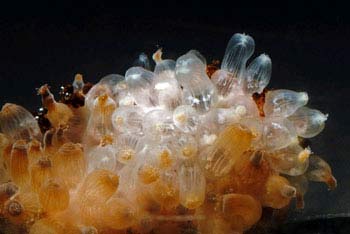Corals are able to withstand high acidity
Under the complex and fragile ecosystem, the coral species are twice as threatened by the warming of the climate: the overheating of the water causes them to whiten and the water has a high acidity, causing their bones to disintegrate.
The more carbon dioxide emissions in the atmosphere, the more it is present in the water, making the oceans more acidic. When testing the laboratory's tolerance to acidity, Israeli researchers have proven that the organism is tough, at least for a while.
Two researchers Maoz Fine and Dan Tchernov of Bar-Ilan University have soaked hard corals that create coral fences in an aqueous solution of increasing acidity to a pH that has never reached 20 million. year. Within 1 month, these corals have lost their crust and become hydrated (polype).
However, they survived and reproduced when clinging to the rock. Even some water has increased in size. When immersed in a normal environment 12 months later, the coral recreates the skeleton with argonite, a form of calcium carbonate.

Coral water has lost its cover when its bones disintegrate (Photo: news.mongabay.com)
This may explain why corals have survived in periods that are detrimental to calcification in Earth's history. However, these results do not confirm that this marine species will survive in future climate change periods.
Many questions remain unanswered: what will be the impact of prolonged rising water temperatures on corals? How long does a marine species that does not cover will survive in the natural state when exposed to predators? Not to mention the pollution and the destruction of coral by humans also threatens coral reefs in the world.
- Warning signs of body acidity are too high
- Coral is the longest living animal on Earth
- What will happen if the entire coral reef on this Earth disappears?
- New hope for corals to die from global warming
- Vietnamese marine corals are severely destroyed
- Discovering corals in depths 'never thought of'
- The strange coral lives in the cave
- Artificial corals can clean seawater in China
- Is coral a plant or animal?
- Vietnamese corals are comparable to world corals
- The prospect of the ocean returning to ancient times in 2100
- Scientists discovered 'self-healing' super corals in Hawaii
 Surprised: Fish that live in the dark ocean still see colors
Surprised: Fish that live in the dark ocean still see colors Japan suddenly caught the creature that caused the earthquake in the legend
Japan suddenly caught the creature that caused the earthquake in the legend A series of gray whale carcasses washed ashore on California's coast
A series of gray whale carcasses washed ashore on California's coast Compare the size of shark species in the world
Compare the size of shark species in the world